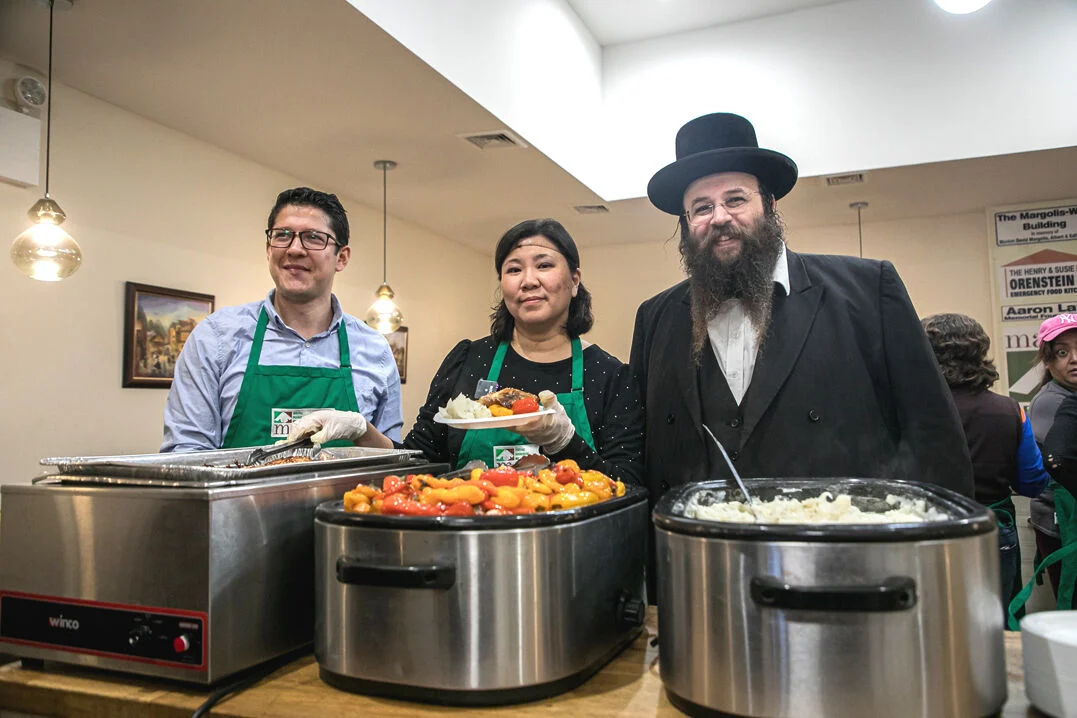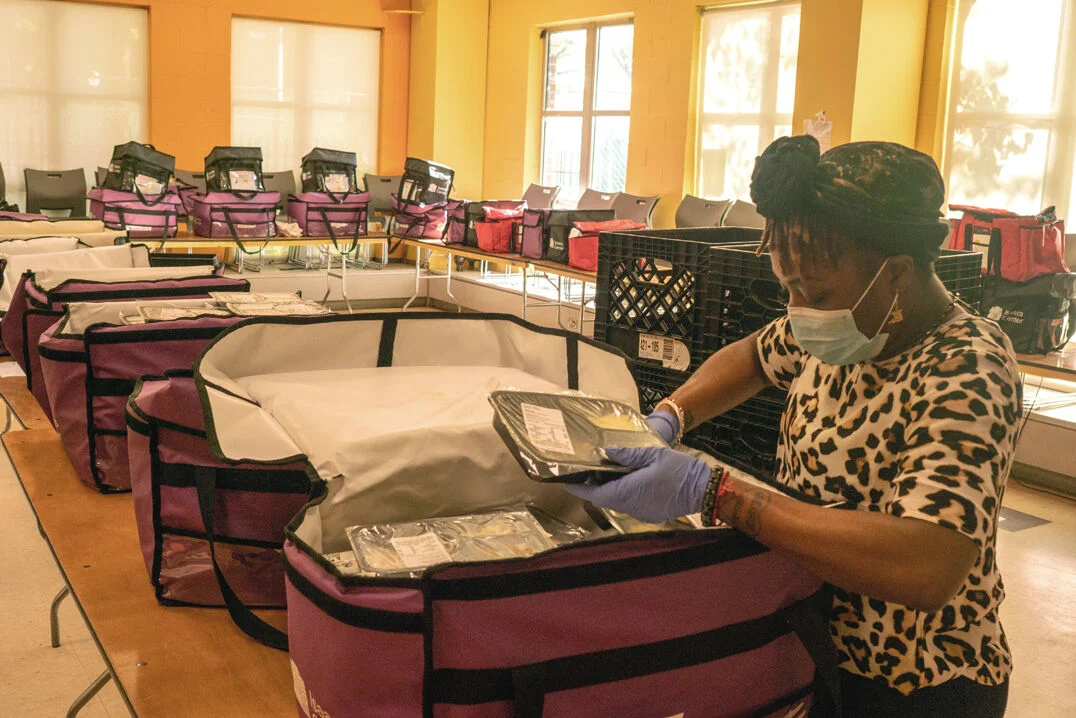Masbia In The Queens Chronicle: Challenging Times For Borough’s Hungry
Posted on: December 22, 2022by Michael Gannon, Senior News Editor Dec 22, 2022


Janis Robinson, vice president of institutions and partnerships at Food Bank for New York City, planned on visiting two of the food pantries that the group supports in the Bronx late Tuesday morning.
“People will be standing on long lines out in the cold,” she said as the morning temperature had barely broken the freezing mark.
Make a random check with operators of a food pantry or soup kitchen or other emergency food providers in Queens and they’ll tell you that they are short of a lot of things this holiday season, including donations of food and funding; and that more volunteers are always needed.
About the only thing none of them are running short of is people who desperately need their help.
Food Bank for NYC operates and supports food banks and soup kitchens; and provides many nonfood social service assistance programs.
“The need for food has definitely increased,” Robinson said. “A recent report from Hunger Free America says there has been a increase — a 34 percent increase — in the number of New Yorkers who don’t have enough food to eat as compared to October 2021. Within our lines, the lines for our food pantries and soup kitchens, there has been at least a 10 percent increase in the number of people.
“What we’re seeing is that there are a lot of New Yorkers having to navigate this whole emergency food sector and use food pantries for the very first time.”
The Masbia Soup Kitchen network, based in Brooklyn, also has a very busy food pantry and soup kitchen in Forest Hills.
Masbia Executive Director Alexander Rappaport told the Chronicle in a recent interview that inflation, the public health situation and other economic factors that are slamming their clients are hurting the organization as well.
He said the food pantry that served 500 families per day during the height of the Covid pandemic is only able to serve about 300 right now.
“It’s scary,” he said.
Rappaport spoke of a statement a few days earlier in which President Biden was cheering a drop in inflation.
“Now the thing is, I support President Biden,” Rappaport said. “What was missing is that poor people’s food is still on the way up. You talk about oil, potatoes, eggs, flour, rice, basic food staples, it is at crazy high levels.” He cited the typical grocery list in preparation for Chanukah.
“For Chanukah, there is a tradition of making latkes, which is basically potatoes and eggs fried in oil,” he said. “It’s not like this last Thanksgiving meal, which they said was up 26 percent. We’re talking about last year you could buy a five-pound bag of potatoes, some eggs and a big jug of oil — seven bucks. Now for the same things you pay 25 bucks.
“The fancy steaks are coming down. The organic strawberries are coming down. That’s rich people’s food.”
Rappaport said there are some independent pressures on many grocery items. He said a large amount of the world’s cooking oil supplies depends on things like sunflower seeds from Ukraine. A bird flu pandemic has required putting down many chickens that has helped create shortages of eggs.
“Things like that helped create this phenomenon. But at the end of the day, people going to the grocery store pay for that,” Rappaport said. “I remember negotiating with a farmer a little over a year ago to buy eggs. He wanted 70 cents per dozen. I said, ‘OK, but the shipping is on you.’ Now if I can get $5 per dozen I pay for the shipping and come out and pick them up … Now if you pay over $6, that’s 50 cents apiece. For an egg.”
Masbia even received a state grant back in the spring to buy New York produce and agricultural products.
“But we’re now eight months into the fiscal year — the state’s budget begins in April — and we’ve spent down our own budget, because the price of food in April was very different from what it is now.”
Citymeals on Wheels is somewhat more focused than many food-relief organizations. It serves mostly homebound senior citizens who for any number of reasons cannot get out on their own to shop for food.
The organization also provides balanced meals on weekends and holidays when regular city food services don’t operate.
Since the Covid pandemic, it also has served people who formerly relied on senior centers for one hot meal a day, but now either can’t get to their regular center or are worried about going.
Rachel Sherrow, the group’s associate executive director and chief program officer, said it has more than 20,000 clients in the five boroughs.
“What we’re seeing now is more isolation because of this trifecta of flu, Covid and RSV,” Sherrow said last week. “That has people fearful of even going out to their local bodega to get some bread and milk.”
The isolation can lead to other worries, Sherrow said.
“What concerns us is that they’re eating,” she said. “If they get depressed and they’re not eating, that can lead to worse medical issues for them and for our healthcare system.”
The group’s recent focus, Sherrow said, is holiday meals.
“Which is certainly very important anytime for folks who are not able to leave their homes, who are going to be alone for Christmas, New Year’s, times that maybe they would be spending with their families,” she said.
“Obviously, we’re all dealing with inflation. So for people who are living on fixed incomes, their dollar doesn’t stretch nearly as far as maybe this time last year, and they have to make some tough choices. And knowing a meal is coming for them every day is some sort of relief for many of them.”
Like Robinson, Sherrow said mission one is to make sure the group is able to connect people in need with food.
“We’re very concerned for the people who have not been returning to the older adult centers since Covid,” Sherrow said. “We’re seeing that the numbers have not been increasing as they should. Where are they? Why are they missing? And where are the gaps? These are people who are on the edge.”
Robinson said Goya Foods, which specializes in Latin cuisine, recently gave Food Bank for New York City a very generous donation; important, she said, in a diverse city where they try and keep people connected with their favorite foods.
The New York Jets, she said, also are among their big boosters. But all three agencies reached by the Chronicle said that naturally, they can always use more financial support in terms of donations. All need volunteers, with Citymeals in particular needing people with cars who can serve as delivery drivers.
Masbia and Food Bank for New York City also are always looking for donors who can link them directly with food supplies.
Rappaport said a link on his website, masbia.org/wishlist, allows donors to purchase reasonably priced food for the group’s clients and even equipment for its soup kitchen through Amazon. The main masbia.org site also has donation and volunteer information.
Robinson said they are in the midst of their 40 Million Meal Challenge, an effort to raise money through the end of December. She said they also could use volunteers for things like their Volunteer Income Tax Assistance program, which she said has gotten $35 million in tax refunds for people who might have had trouble filing in the past.
Volunteers, donors and those who need food are asked to go to foodbanknyc.org or call them at (212) 566-7855 to find the right person to speak with.
Those seeking help from Citymeals on Wheels or who are looking to donate or volunteer can go to citymeals.org.
For sponsor Masbia Soup Kitchen click here.
To read original article click here.




